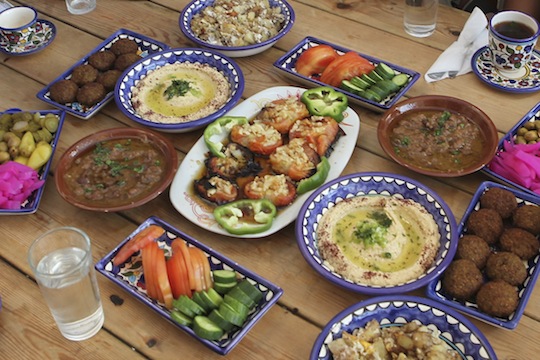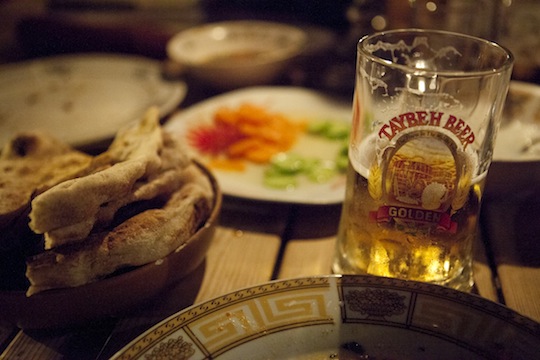A trip to Hosh Al-Elleeya, a restaurant in the heart of Birzeit’s old city.
Legend has it that the finest restaurant in the West Bank is located in the university town of Birzeit. My friend Gil and I decided to journey there at the end of a day of discovery in Ramallah. We took a 40 sheqel cab there, winding through the northern suburbs, overlooked by the settlement of Beit El.
The restaurant Hosh Al-Elleeya is located in the very heart of Birzeit’s old city. It opens to a quiet square, surrounded by stone dwellings. Nothing in Ramallah’s modern bustle foretells a place such as this, and none of the city’s restaurants can compete for atmosphere. We took a seat and were immediately welcomed by manager Shurouq Qawariq and served lupin beans, a favorite Palestinian drinking snack and appetizer.
A “hosh” is a country dwelling that combines living quarters and agricultural functions. The restaurant occupies one such structure. It is owned by a family that has lived in Birzeit’s “hoshes” for many generations. There’s no country orientalism here, no search for contrived “charme champêtre.” The modest wooden furniture is both functional and appealing. The wall is decorated by an authentic road sign from the Gaza Strip, announcing that the (now destroyed) Palestine international airport is five kilometers away.
Gaza is also on the plate, and the “Gaza salad” might be the spiciest I ever put in my mouth. Manager Qawariq (unaware of our nationality) explained that Gazan cuisine is known for its intensity on the Scoville scale. She suggested that we try the Hosh’s newest offering: vegetables and meat prepared in ceramic dishes. The root vegetables were elegantly al dente without being undercooked. A bowl of green beans and lamb meat was delightful.
However, if one dish served to us was truly exceptional, it was the grilled rabbit on musakhan (flatbread with onion and sumac, soaked in the roasted meat’s fat). While the bread itself was somewhat fatty to my taste, the rabbit was exceptionally tender and flavorful. Rabbit is rarely found in Israel, despite the growing popularity of other non-kosher meats, but it was not mere exoticism that made this dish exceptional. When consumed together, its various components worked in perfect harmony.
In my numerous expeditions into the Ramallah area, I have yet to encounter such a fresh approach to traditional food. Across the wall, Palestinian chefs like Hussam Abbas of Al Babour, in Umm Al Fahm, have often attempted to bring local country cuisine to a restaurant setting, but often backed down after a while, since customers were in the habit of ordering only grilled meats and cliché salads. The Hosh’s chef, Shadi Muhammad, stayed his path in the three years since the restaurant opened, providing diners with a unique opportunity. Why, then, was the terrace nearly deserted on a Thursday night?
It appears to be the rabbit’s fault. The Hosh’s owner, Mazen Sa’ade, has been busy of late developing an organic farm near Beit Jala in the southern West Bank. The poultry and rabbit used in the Hosh Al-Elleeya kitchen are all raised in new Hosh Al-Yasmin, which also offers a mountain campground for travelers. Focus on the project seems to have extracted some energy from the restaurant’s promotion, but clearly did not harm its quality.
We went into the West Bank, as we usually do, seeking to widen our understandings of Palestinian realities. We found ourselves in an historically Christian town, drinking pint after pint of great local Taybeh beer, and realizing once more that these realities are more complex than any cliché. The memory of an organic rabbit musakhan remained with us, as we crossed the concrete walls under powerful military lights back into familiar Jerusalem. It was subtle compensation for this bitter world, and a delight that leaves no room for dessert.



